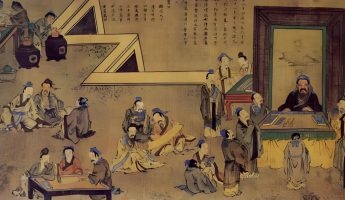In the current wave of market economy, the role and significance of philosophy often raise questions from various sectors of society. Even scholars in the field of philosophical research sometimes cannot help but reflect on the practical value of philosophy. This topic is worth exploring in depth, and the primary task is to clarify the essence of philosophy.
The Essence of Philosophy
There have always been different opinions about what philosophy is. Some people see it as a discipline of worldview, while others believe it is a comprehensive refinement of natural and social sciences. Moreover, some compare philosophy to a lighthouse in life, or a bitter but beneficial potion. Faced with these diverse definitions, it is not difficult to find that each explanation has its own rationality, and the key lies in how to deeply understand and grasp them. As Professor Li Xiulin’s book “What is Philosophy” explores, philosophy is not an unattainable concept, but a light of wisdom that requires us to feel and comprehend with our hearts.
Engels’ discourse in “Dialectics of Nature” provides us with another perspective: theoretical thinking is an ability that needs to be constantly refined, and philosophical learning is an indispensable way of this refining process. Philosophy, like physical exercise to the body, is a deep training of human theoretical thinking. Through the study of philosophy, we can not only enhance our ability to analyze and solve problems, but also inspire wisdom in this process, making ourselves wiser. Philosophy, therefore known as the ‘School of Wisdom’, endows us with the courage and wisdom to explore the unknown and pursue truth.
The Content and Scope of Philosophy
When it comes to philosophical content, we may refer to the diversity of sports to understand it. Just as sports include multiple events such as football, basketball, and athletics, philosophy also encompasses profound explorations of life, truth, good deeds, and beauty. Philosophy is not limited to the pursuit of the origin of the universe, but also involves humanity’s eternal pursuit of truth, goodness, and beauty. From this perspective, Confucius, as a model of ethical philosophy, and Zhuangzi, renowned for their unique artistic philosophy, are undoubtedly world-class philosophical masters.
When defining philosophy, we should go beyond geographical limitations and examine it from a global perspective. The philosophical achievements of Europe are undoubtedly brilliant, but the philosophical ideas of China, the wisdom of India, the Zen lifestyle of Japan, and the profound philosophy of Arabia are all common spiritual treasures of humanity. The definition of philosophy should be cross-border and inclusive.
The Function of Philosophy
After clarifying the essence and content of philosophy, it is not difficult to discover its important role in modern society. Firstly, philosophy can greatly enhance our theoretical thinking ability, enabling us to maintain a clear mind and profound insight when facing complex problems. Secondly, the concept of truth, goodness, and beauty contained in philosophy can not only enhance our scientific literacy, moral character, and artistic cultivation, but also lead us to a higher realm of life. This realm is a comprehensive and profound understanding and grasp of the world and life, and a concentrated reflection of an individual’s comprehensive qualities.
In today’s world where material needs are met, people’s pursuit of spiritual fulfillment is increasingly prominent. Philosophy, as a spiritual product, has become an important source for meeting the high-level spiritual needs of humanity with its unique charm and profound ideas. In the fast-paced modern life, philosophy is like a clear spring, nourishing our souls and guiding us to explore the meaning and value of life. Therefore, the function of philosophy is not only to enhance personal wisdom and realm, but also to provide a continuous source of spiritual power for the progress and development of society.



